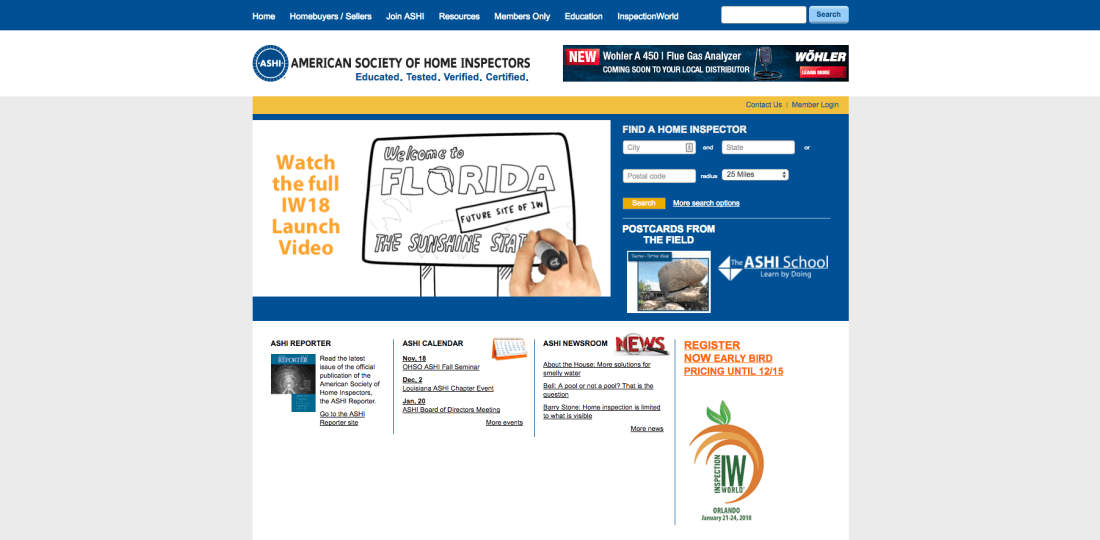
If you’re like most consumers, the biggest single investment you will make in your lifetime is the purchase of a home. According to Zillow, a leading real estate and rental marketplace, the median U.S. residential property was worth $202,700 in September—and values are likely to rise. U.S. home prices have increased nearly seven percent over the last year, and Zillow predicts they will gain another three percent or more in the next 12 months.
Sounds like buying a home is a great investment, right? Not so fast. If you don’t properly vet the property before making an offer, you could find yourself overpaying for a home that’s hiding substantial problems. Fortunately, a home inspection—conducted by an experienced, ethical inspector like those found at ASHI—will help you avoid this costly mistake.
Smart Homebuyers Turn to ASHI Certified Inspectors
Founded in 1976 by a group of builders, engineers, handymen and other professionals who were performing property inspections before they were an ‘official’ real estate tool—ASHI, or the American Society of Home Inspectors—established the first standards of practice and code of ethics for the professional inspection of homes.

“These guys all sat down, and it was a big deal,” said Frank Lesh, ASHI’s executive director. “They met at Rutgers University and set up some committees. I actually have the original handwritten copy of the code of ethics, and it is amazing. It looks like it was done by a monk, written in cursive on a piece of parchment.”
Since then, the not-for-profit professional association has continued to promote standards for property inspections and to provide educational programs for its members. In fact, all ASHI inspectors must pass rigorous technical examinations. They must also perform more than 250 professional inspections before they earn the ‘certified’ title.
Whenever you’re preparing to buy a home, it’s critically important to choose an unbiased ASHI inspector, Lesh said. “Our code of ethics forbids us from performing any work on a house that we inspect for at least a year after we do the inspection. Also, ASHI is the only home inspection organization with third-party certification.”
Because Homes Don’t Have ‘Check Engine’ Lights
Lesh likens a thorough home inspection by a qualified inspector to the examination of a used car by a mechanic.
“Today, we use Carfax and stuff like that, but before that was available, you would take the car to a mechanic or have one come and take a look at it before you bought it,” he explained. ‘Unfortunately, a house does not have a check engine light. If you’re an average person, you can’t walk into a house and know if it has problems. You can’t listen to it like you can a car. You can’t drive it around the block.”
A home inspector is trained to recognize potential issues and help you determine the likelihood of costly problems down the line. When conducting a visual inspection of the home’s structure and physical systems, he or she will examine everything from the roof to the foundation. This includes central heating and air condition systems, plumbing and electrical systems, walls, ceilings, floors, windows, doors, the attic and basement, and structural components.
If issues are discovered, you can then ask the home seller for concessions or to make expensive repairs before you close on the property. You could even ask for a reduction in the purchase price.

Finding an ASHI Inspector
“On the ASHI website, you’ll see a ‘Find an Inspector’ box in the upper right-hand corner,” Lesh explained. “All you have to do is type in your city and state or your zip code. You’ll get a list of ASHI members within your chosen radius.”
Easily identify the inspectors who have earned ASHI certification by the badge next to their name. Click on “Inspector Details” to dig deeper into each inspector’s areas of expertise.
“Let’s say you want to have a radon test and termite inspection as well as a standard home inspection,” Lesh said. “Inspectors with those qualifications will list them so that you can choose one who can do everything you need.”
“We have 80 or more categories of expertise,” he continued, “including old homes, new homes, and commercial inspections. There are all kinds of things members can take ancillary classes in.”
He notes that it’s a good idea to make a list of several inspectors who suit your needs, as your first or even second choices may have long wait times.
“In a lot of states, you have a couple of weeks to arrange for an inspection after your purchase contract is accepted,” Lesh said. “But in some states—like Illinois where I am from—you only have five business days. That’s not a lot of time.”
